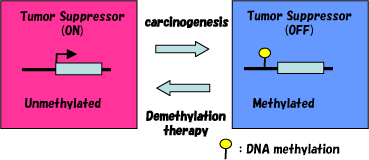| Epigenetics and Diseases |
| Correspondence
Izuho Hatada
Biological Genome Resource Center, Institute for Molecular and Cellular Regulation,Gunma University
|
| Extensive genetic analysis of human diseases began more than ten years ago; however, some diseases cannot be explained by genetic changes but rather by epigenetic changes. One of the most well-known examples is cancer. It is well recognized that cancer is caused by transcriptional silencing of tumor suppressor genes by genetic changes; however, one of the most exciting frontiers in cancer genomics is transcriptional silencing of tumor suppressor genes by epigenetic changes such as DNA methylation. Further, epigenetic silencing is a more frequent mechanism of gene inactivation than genetic change in some cancers.
|

| Although few epigenetic changes causing diseases have been found other than in cancer, there are many reports which suggest their involvement; one example is schizophrenia. Reduced reelin expression in cortical GABAergic interneurons of schizophrenia patients is a consequence of epigenetic hypermethylation of the reelin gene. The protracted administration of large doses of methionine to mice generates some of the behavioral phenotypes observed in schizophrenia. This is associated with hypermethylation of the mouse reelin gene promoter. Valproate, which reactivates the reelin gene, corrects the schizophrenia-like epigenetic behavioral modifications induced by methionine in mice. Epigenetic changes are thought to be involved in other diseases such as autism and diabetes. |

